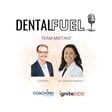
Dr. William Chen: Team Mistake
This episode is pure dental gold!
Listen in as Dr. William Chen shares a team mistake and explains, “I don’t want to lose good people.”
Imagine doing a 6-month financial check-in with your team to keep the dream team intact!
Dr. Chen knows the importance of finding the right people with the perfect modes of operation for a flawless team synergy.
And wait for it... coaching is the MVP in his personal and professional playbook! Tune in and level up your dental game!
About The Guest:
Dr. Bill Chen is a dentist based in Sebring, Florida. He graduated from the University of Florida and started his own practice, Chen Dental, in 2005. Over the years, he has grown his practice to 17 chairs and has a team of five associates, with a sixth one on the way. Dr. Chen is dedicated to continuous learning and has been working with a coach for over a decade to help him scale his practice successfully.
Want to know more about Kolbe and Financial Peace University?
- https://www.kolbe.com/
- https://www.ramseysolutions.com/ramseyplus/financial-peace?snid=products.pay-off-debt-and-build-wealth.financial-peace-university
Summary:
Dr. Chen discusses the challenges of building a team and the mistakes he has made along the way. He emphasizes the importance of not losing good people and shares how his practice has implemented six-month financial check-ins to ensure that team members are on track and engaged. Dr. Chen also talks about the shift from hiring for the person to hiring for the position, creating clarity and expectations within the practice, and using the Kolbe test to understand team members' strengths and modes of operation.
Key Takeaways:
- Losing good people is a costly mistake, and it's important to have regular check-ins to ensure team members are on track.
- Instead of hiring for the person, create the position first and find the right fit for the role.
- Clarity and expectations are crucial for team members' success and engagement.
- Understanding team members' strengths and modes of operation can improve communication and collaboration.
- Balancing different types of team members can create a more cohesive and effective team.
Connect with Ignitedds: @ignitedds



















